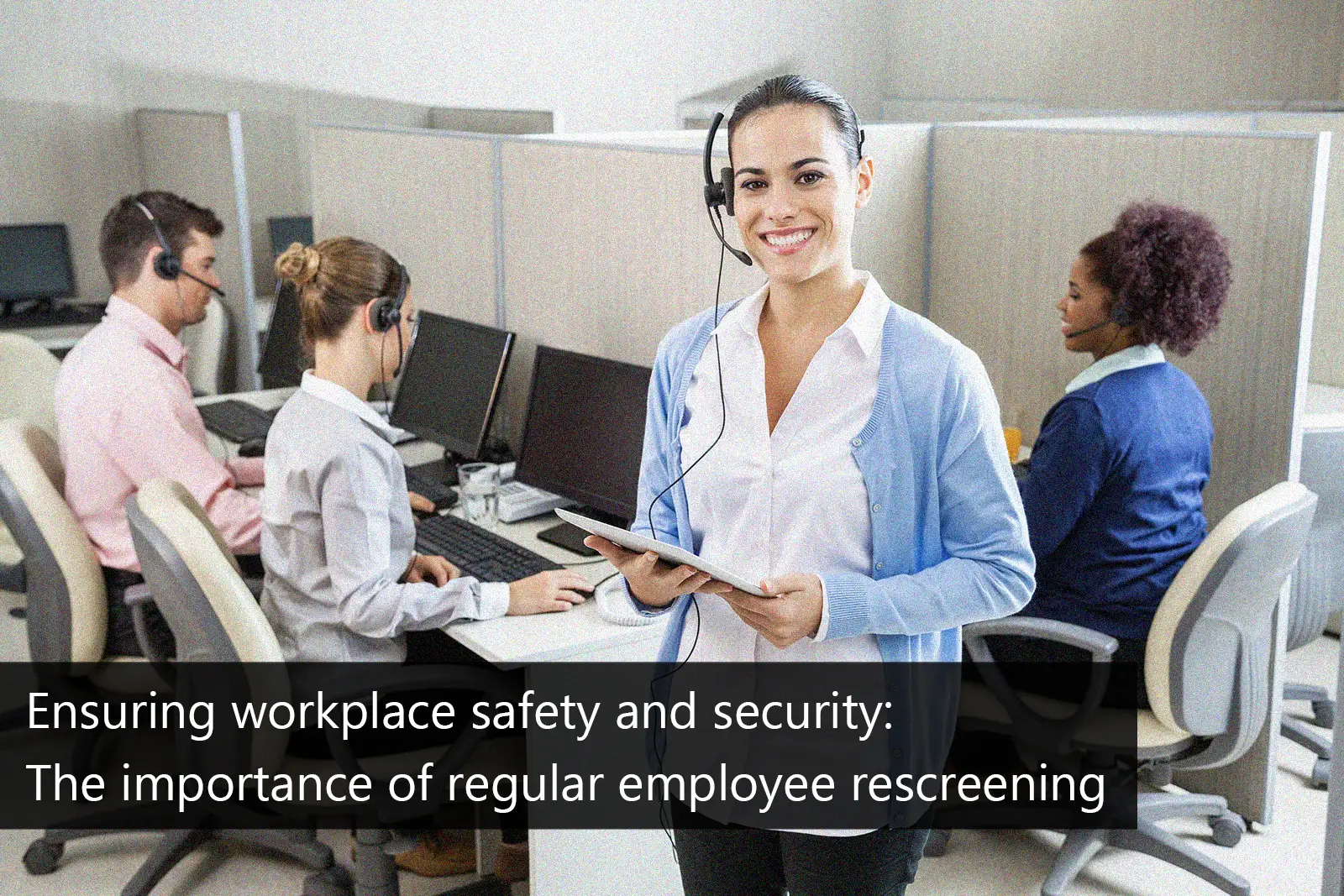Workplace Safety: Why Regular Employee Rescreening is Essential
June 17, 2022
As discussed in a previous post, many companies haven’t had the time to update their screening programs since the pandemic began in 2020. Even worse, some were forced to reduce packages, or remove components from their screening programs, whether attempting to reduce costs, or hire faster. However, companies have largely begun reimplementing aspects of their previous programs, if not auditing their programs in their entirety and redesigning them from the ground up. One of the components often overlooked these past few years has been rescreening. Today we’ll examine what rescreening is and why it is so important for your company.
Rescreening employees plays a crucial role in the implementation of a complete and effective background screening program. By conducting regular rescreening, companies can effectively identify potential risks and ensure that their employees consistently meet the established standards of the organization throughout their employment tenure. Rescreening involves the process of re-verifying an employee's background during their period of employment, typically occurring no sooner than 12 months after their initial hiring.
Similar to pre-employment screening, a rescreening program encompasses a range of checks tailored to the employee's specific role and the perceived level of risk associated with it. These checks are implemented under various circumstances, each serving a unique purpose.
When implementing a rescreening program, checks should be conducted at specifically defined intervals, such as an annual or bi-annual cadence, to maintain and update the continuous evaluation of employees. Rescreening should be performed in the event of an employee's promotion to ensure their suitability for the new responsibilities and to mitigate any potential risks. Following a workplace safety incident, rescreening is essential to assess the employee's ongoing suitability for their role and to address any emerging concerns promptly. Finally, random rescreening is another significant aspect to consider, particularly with drug tests, which helps companies maintain a vigilant approach to risk management.
It’s important to understand that rescreening is not a one-time occurrence, but an ongoing process that should be regularly conducted. This regularity offers several valuable benefits for companies. Firstly, rescreening contributes to the commitment to a safer workplace environment. By periodically reviewing employee backgrounds, organizations can effectively identify changes in circumstances or dynamic risks that may give rise to potential threats, ranging from embezzlement, fraud, and theft to violent behavior. Through this proactive approach, companies can address these risks promptly and take appropriate measures to ensure the well-being and security of their employees and the company as a whole.
Secondly, rescreening helps maintain accurate records and facilitates compliance with relevant regulations and standards. By verifying pre-employment background checks, organizations can ensure the information on file remains up-to-date and valid, thereby reducing any potential legal or regulatory risks. Compliance with industry-specific requirements and applicable laws is crucial for the reputation and integrity of a company.
Moreover, rescreening ensures you’re able to verify employees continue to meet the high expectations established by the company for long-term growth and success. As organizations evolve and adapt to new challenges, employees may be entrusted with additional responsibilities or granted access to more sensitive information or financial resources. In such cases, conducting additional checks during the rescreening process becomes necessary to evaluate the employee's suitability for these expanded roles. This ensures that the organization's interests and assets are safeguarded, while also promoting the professional development and advancement of qualified individuals within the company.
Rescreening is an important component of a complete background screening program in any organization. Its importance lies in the ability to identify potential risks, maintain safety, ensure compliance, and verify employees' ongoing suitability for their roles. Rescreening programs encompass checks conducted at specific intervals, in the event of promotions, following workplace safety incidents, and through random screenings. By implementing rescreening as an ongoing process, companies can proactively address changing circumstances and evolving risks, thereby fostering a secure and productive work environment. Regular rescreening also aids in maintaining accurate records, complying with regulations, and ensuring that employees continuously meet the high expectations set by the organization for sustained growth and success.
We are currently offering a free 30-minute screening program review with our compliance experts. Schedule today and we'll step through every aspect of your program and where you may be able to improve, as well as how you can successfully add rescreening to your existing program. There is no obligation or risk involved, and you'll receive a free report you can review with team members following the consultation.


